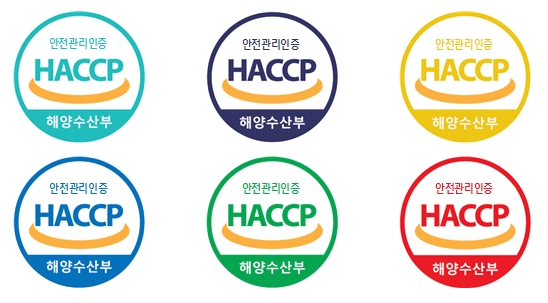- Hazard Analysis Critical Control Point (HACCP) is critical management of production processes that can be affected by hazards in order to prevent hazards mixing into or remaining in marine products, and to prevent the contamination of marine products (Paragraph 2 of Article 70 of the Agricultural and Fishery Products Quality Control Act and Subparagraph 1 of Article 2 of the Standards of Critical Control of Hazards in Marine Products at All Stages of Production and Shipping).
- An inland culture fishery that falls under any of the following categories is eligible for the Standards of Critical Control of Hazards in Marine Products at All Stages of Production and Shipping (Article 3 of the Standards of Critical Control of Hazards in Marine Products at All Stages of Production and Shipping):
· Culture businesses issued a permit for inland saline aquaculture business in accordance with the Fisheries Act
· Culture businesses declared as an inland aquaculture business in accordance with the Inland Water Fisheries Act
- A facility registered or to be registered as a HACCP facility must be a facility which has been issued a permit for inland saline aquaculture business in accordance with the Fisheries Act or a facility declared as an inland aquaculture business in accordance with the Inland Water Fisheries Act (Paragraph 1 of Article 4 of the Standards of Critical Control of Hazards in Marine Products at All Stages of Production and Shipping).
1. Fishery facility/equipment management
2. Fishery sanitation management
3. Seed, animal medicine, feed, and water management
4. Drug management
5. Breeding and shipping management
6. Other matters necessary for application of the hazard analysis and critical control points ("HACCP")
- A facility that wishes to register or has registered as a HACCP facility must create and maintain a HACCP management manual (Article 5(2) of the Standards of Critical Control of Hazards in Marine Products at All Stages of Production and Shipping).
- A HACCP fishery must follow the HACCP standards for fisheries and the sanitation standards indicated in Attached Table 2 of the Standards of Critical Control of Hazards in Marine Products at All Stages of Production and Shipping (Paragraph 3 of Article 4 of the Standards of Critical Control of Hazards in Marine Products at All Stages of Production and Shipping).
- A facility that fulfills HACCP standards can use the HACCP symbols shown below (Article 9 and Attached Table 2 of the Standards of Critical Control of Hazards in Marine Products at All Stages of Production and Shipping).

- A business with HACCP obligations which does not fulfill the HACCP standards or fulfills them unconscientiously can be ordered to correct, restrict, or cease production, processing, shipping, or transport, or to improve or repair its production or processing facilities. In cases of gross non-compliance, a business's HACCP registration may be revoked (Subparagraph 3 of Article 78 of the Agricultural and Fishery Products Quality Control Act).
- Failure to comply with an order of correction, restriction, or to cease production, processing, shipping, or transport, or with an order of improvement or repair of production or processing facilities, as specified above, is grounds for imprisonment of up to 1 year or a fine of up to KRW 10 million (Subparagraph 9 of Article 120 of the Agricultural and Fishery Products Quality Control Act).